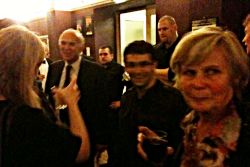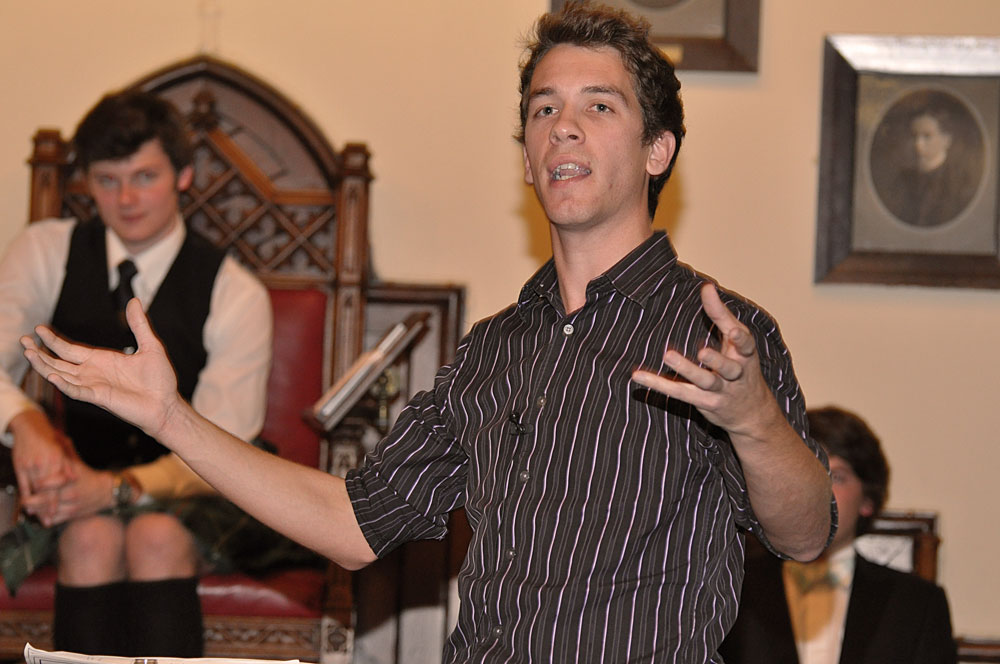Socialist Appeal supporter Adam Booth spoke against Vince Cable, the Secretary of State for Business in the UK coalition government, in the Cambridge Union on Thursday 27th October, in a debate that highlighted the two starkly contrasting choices facing society as a result of the crisis of capitalism: austerity or socialism.
The Cambridge Union is a debating society affiliated to the University of Cambridge, which invites established speakers to discuss a motion before a public audience, with participation coming from the floor as well. The motion for discussion on this particular evening was “This House Believes There is No Alternative to the Cuts”. Speaking for the proposition were Matthew Sinclair, the founder of the Taxpayers’ Alliance (essentially the British equivalent to the US Tea Party), together with Business Secretary Vince Cable. Joining Adam Booth in the opposition were Labour MP and shadow Chief Secretary to the Treasury, Rachel Reeves, as well as the local Cambridge Labour parliamentary candidate and national political officer for Unison, Daniel Zeichner.
The fact that Adam was invited to speak reflects the level of recognition that he and Socialist Appeal have attained in Cambridge over the past two years. The Cambridge Marxists have consistently intervened in the local youth movement during this period, most notably in the university occupation in the autumn of 2010, when we put forward a concrete political programme and tied the youth struggle to the workers’ struggle, culminating in the Cambridge General Assembly, attended by hundreds of students and workers. Additionally, Adam ran for the University student union presidency earlier this year and came second with over 1000 votes (approximately 41% of the vote).
In addition, the Cambridge Marxist Discussion Group, founded by Socialist Appeal three years ago, has grown from strength to strength. This was demonstrated at the most recent freshers’ fair, where the MDG signed up more people than either the Conservative Association or the Liberal Democrats Society. Socialist Appeal is the most established group on the left in Cambridge right now, particularly amongst the youth, and so it is of no surprise that when the union wanted a Marxist perspective on the question of the cuts, it turned to Adam.
Most of the speakers, unwilling and unable to tackle the real reason for the cuts – i.e. the crisis of capitalism – focused on the question not of if the cuts are necessary, but of how cuts should be introduced. Rachel Reeves spoke of how the cuts need to be introduced more slowly than they have been and in fewer areas, in order to stimulate growth – something she claimed could be achieved through Labour’s “Five Point Programme”. Daniel Zeichner failed to put forward any political points and used his contribution to attack Vince Cable and the Liberal Democrats, meaning his speech resembled a stand-up comedy set full of one-liners to get laughs from the audience.
These contributions from established Labour Party figures indicate what the Marxists have consistently pointed out: that in a period of crisis, the reformists are unable to provide a real alternative to workers and youth. Instead, they put forward the same programme as the bourgeois parties, and when in power end up carrying out the cuts on behalf of the capitalists. In opposition, they are reduced platitudes; to idealist and utopian schemes of “stimulating growth”. But growth under capitalism is not like a tap that can simply be turned on and off at will. If growth could simply be conjured up upon demand under capitalism, then there would never be any recessions in the first place!
Then someone spoke from the audience: “If Labour had remained in power they would have made the cuts as well.” As the debate increasingly became a debate between Labour and the coalition government, the validity of this statement became all too apparent. There was no talk of rationally and fundamentally changing our economic system, but rather a tussle over the minutiae; over how this cut may affect that and that cut may affect this.
Deficit
 Vince Cable (left)Someone from the audience made the point that the deficit could be significantly reduced by cutting Trident and addressing tax evasion. Matthew Sinclair responded, “How will you expect the rich to stay in the country if you make them pay their taxes?” Sinclair was strangely right. Under capitalism, how can we expect the rich to pay for crises? The demand to simply “tax the rich” put forward by the reformists who seek a solution within capitalism and assume that capitalists can live according to some ‘moral economy’ is futile, however much we might like to reclaim some of their grotesque profits for the public good. As we have explained before however, the only way you can actually get the rich to pay their “fair share” is to take control of their wealth. This means, primarily, nationalising the banks and finance houses together with the big monopolies which dominate our economy and placing them under democratic workers’ control and management as part of a socialist plan of production.
Vince Cable (left)Someone from the audience made the point that the deficit could be significantly reduced by cutting Trident and addressing tax evasion. Matthew Sinclair responded, “How will you expect the rich to stay in the country if you make them pay their taxes?” Sinclair was strangely right. Under capitalism, how can we expect the rich to pay for crises? The demand to simply “tax the rich” put forward by the reformists who seek a solution within capitalism and assume that capitalists can live according to some ‘moral economy’ is futile, however much we might like to reclaim some of their grotesque profits for the public good. As we have explained before however, the only way you can actually get the rich to pay their “fair share” is to take control of their wealth. This means, primarily, nationalising the banks and finance houses together with the big monopolies which dominate our economy and placing them under democratic workers’ control and management as part of a socialist plan of production.
Then it was time for Mr Cable to speak. He was very much in keeping with the same tone that he suddenly assumed upon entering into government last year: “I hate cutting jobs and services and raising fees, but I have to”. One could sense the Vince Cable of 2009 desperate to come to the fore, as was shown when he was quick to point out that he considers himself a Social Democrat, not a Liberal. [Note: In the 1970s Vince Cable was Labour councillor in Glasgow, but in 1982 when the right wing of the Labour Party split away to form the Social Democratic Party he went with them, subsequently ending up in the Liberal Democrats when the Liberals and Social Democrats fused.]
Where he differed from the other speakers, however, was in his partial understanding of the economy. Where those from Labour just sounded idealistic and Matthew Sinclair just sounded like a right-wing libertarian, Cable presented a picture in which austerity was the necessary outcome, not driven by ideology but by material circumstances, something that he hinted to in a joke: “If there were a Marxist here right now, they’d probably say that this is a crisis of capitalism.” Oh, how right Vince was.
Up stepped Adam Booth, announcing to the audience they he is a Marxist and that, yes, this is a crisis of capitalism. “I’ve only got ten minutes to explain the internal contradictions of capitalism!” – such was the task that had to be undertaken due to the nature of the debate. Adam spoke about the fundamental contradictions within the capitalist system – of how workers receive less in wages than they produce, and of how this leads to a crisis of overproduction. Adam explained how the ruling class began attacking the trade unions in the 1980s, how this was used to drive down wages, and how credit was encouraged to overcome the resultant cut in the effective demand. This artificial expansion of the market through credit, Adam explained, only delayed the crisis, which we are now seeing today.
Unlike all the other speakers, Adam raised the crucial question: “Who pays?” The answer is, under capitalism, ordinary people. It was demonstrated how those in the capitalist class continue to increase their wealth, whilst at the same time proposing austerity measures that are becoming more and more severe. Significantly, Adam raised the point that this austerity must necessarily continue under capitalism, because of the demands by the bosses for their pound of flesh. “These cuts are necessary,” Adam explained, “but only within the capitalist system.”
These cuts are not simply ideological, they are necessary for capitalism to maintain its privileges and stolen profits. It is utopian to think that capitalism can morally “reform itself” to benefit all in society. It is short-sighted to think that reformism can bring about a recovery from this crisis by stimulating growth. All the measures that the ruling class would normally use to get out of a crisis have already been used up: a Keynesian stimulus is no longer possible due to the billions that have been already spent bailing out the banks; monetary policy is useless, as interest rates are already at almost zero; the bourgeoisie is reduced to desperate measures such as quantitative easing.
Crisis
Reformism can only be implemented in times of abundance. In a period of crisis, the reformists turn into their opposite and carry out counter-reforms. Vince Cable reminded us of a passing note to him from his predecessor when he assumed office last year; it said: “there is no money left”. This is completely true. With no money, there is nothing a bosses' government can do but impose austerity. That is why we must fight for the socialist transformation of society, where the economy is democratically run for the good of the majority; for the 99% rather than the 1%! There is simply no alternative. Capitalism must be shown the door.
This message was made extremely clear to the audience in attendance and seemed to strike a chord with many, shown by the loudest applause of the evening after Adam spoke and great interest in the Socialist Appeal paper and the Marxist Discussion Group from people in the bar afterwards. The programme of the Marxists played a huge part in the motion “This House Believes There is No Alternative to the Cuts” being rejected by a vote of 204 to 174. People believe there is an alternative to the suffering we are seeing around us today. Even Vince Cable wanted to buy a Socialist Appeal, but unfortunately he didn’t have any money. How tragically ironic.
It is all very well, however, to debate within a cosy chamber, but, as was stressed by Adam, we must be active in our struggle against this austerity! Students were urged to support the 30th November public sector strikes, something that the Cambridge University Student Union has backed by calling for a mass student walkout. It is crucial that we link the struggles of students and workers together so that we can bring about the socialist transformation of society and avoid our only other alternative: severe austerity.
Students and workers: unite and fight!
Source: Socialist Appeal (Britain)

